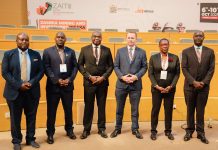When it comes to developing a more investor-friendly mining policy, Zambia doesn’t always have to look to countries like Chile for inspiration; there’s an equally good example right on its doorstep – Botswana. Mining policy in Botswana is predictable, competitive and stable, making the country “one of the most attractive mining destinations in the world”.
That’s according to a report, Back to the drawing board on mining law, by Dr. Anthea Jeffery, Head of Policy Research at the South African Institute of Race Relations (SAIRR), published in October 2016.
The report contrasts Botswana’s mining law with that of mineral-rich South Africa, and argues that South Africa has a lot to learn from Botswana. “South Africa could have followed its neighbour’s example… Instead, South Africa chose to move in the opposite direction.”
The consequences of this policy choice for South Africa are evident, the report says, noting that even during the global commodity boom from 2001 to 2008, South Africa’s mining industry shrank by 1% a year, while mining sectors in other countries – including Zambia – expanded by 5% a year on average.
“Botswana opted to reform its 1977 mining legislation so as to bring it into line with international best practice. The new mining law Botswana adopted in 1999 is thus predictable and clear,” the report says.
The mining minister and his officials have “little or no administrative discretion”, making the licensing process transparent and predictable. The obligations imposed on the holders of mining licenses are “reasonable, certain and stable”, having remained effectively the same since the statute was adopted. Timeframes for decision-making are “brief”: 60 days for prospecting licences, for instance, and 20 days for large-scale mining licences.
“Botswana has reaped substantial benefit from its 1999 reforms, becoming one of the most attractive mining countries in the world on various elements in the [annual Fraser Institute] survey,” the report says.

The report highlights the following strengths of Botswana’s Mines and Minerals Act:
1. Simple criteria for granting of mining rights
Applicants for mining rights in Botswana must meet a handful of simple requirements relating largely to the ability to efficiently fund and exploit the mineral deposit. The minister “must grant the licence” if these conditions are met. Unlike in South Africa, there are no black economic empowerment, housing or social obligations, and only a limited “local preference” requirement.
“The legislation shows a clear understanding that the substantial investment required to develop a mine and carry out mining operations is itself a major economic and social good,” the report says. “In this process, capital is committed and jobs are created, while household living standards and expenditure levels rise. At the same time, tax revenues and export earnings are generated for the benefit of the society as a whole.”
2. No beneficiation requirements
No beneficiation requirements are imposed on mining companies. All that is required is that the holder of a mining licence should be able to run mining operations that make “the most efficient and beneficial use of the mineral resources” in the relevant mining area. It allows mining companies to “dispose of any mineral products recovered” without any price or export controls aimed at boosting local beneficiation.
3. No free participation by the state
The Mines and Minerals Act gives the Botswana government, when issuing a mining licence, “the option of acquiring up to 15% working interest participation in the proposed mine” – which allows it to appoint two directors and receive dividends in proportion to its shareholding. However, the policy obliges the government to pay for this working interest – again, proportional to its shareholding – and to contribute to the costs both of obtaining the mining licence and developing the mine.
“The Botswana government thus has no right to a ‘free’ interest in a new mine,” the report says. “In addition, its maximum 15% stake is not big enough to give it control of a mining operation in which it chooses to participate”.
4. No arbitrary cancellation of mining rights
Mining licences may be cancelled only for failure to meet a number of “clear and reasonable obligations”, which have remained effectively unchanged since 1999, the report says. This contrasts with South Africa, where the report says mining licenses can be cancelled for reasons other than the efficient funding and exploitation of the mineral deposit. These relate primarily to the requirement that mining companies must “promote the active participation of black South Africans in the mining industry” in areas such as ownership, procurement, housing and skills development. Many of these provisions are “inherently ambiguous” and “unrealistic”.
5. Low levels of corruption
Botswana consistently ranks as the least corrupt country in Africa, according to the annual Transparency International Corruption Perceptions Index rankings. In 2015, Botswana was 28th in the world out of 167 countries surveyed. The next-nearest African country was 44th.
Mining executives operating in Botswana are largely positive about operating there, and highlight lack of corruption. One is quoted in the SAIRR report as saying: “Reasonably quick decision-making and access to decision-makers – no corruption.”
This contrasts with the quotes attributed to mining executives operating in South Africa. One example: “In South Africa, the entire process of the administration of exploration rights is protracted, corrupt, arbitrary, inconsistent and a nightmare.”
“Mining policy in Botswana is predictable, competitive, and stable”
The report makes much of Botswana’s economic performance since independence 50 years ago, in 1966, saying it had successfully used its mineral wealth to become an upper-middle-income country.
Botswana has focused on making its mining industry, and indeed its tourism industry, a world-class success, trusting to the developmental effects that would be achieved in doing so. The approach has clearly worked.
“Between 1966 and 1999, Botswana recorded an average annual growth rate of 9% of GDP, making it one of the fastest-growing countries in the world. In the past decade, despite the global commodities slump, its growth rate has averaged 5% of GDP. It has risen up the World Bank’s ratings to attain the status of an upper-middle income country, and had average GDP per capita of some $7 240 in 2014.”
The SAIRR report’s praise of Botswana does come with caveats. “Botswana’s mining regime is not without fault,” it says, citing mainly the lack of clear provisions on the granting of mining licences for diamonds, which essentially depend on the agreements reached between applicants and the Botswana government. “At the same time, Botswana has got much of its mining law right.”
The report concludes that if South Africa is to make the most if its vast mineral wealth – worth $2.5 trillion, ahead even of Australia and Russia – it should make its mining law more like that of Botswana – “predictable, competitive and stable”.
SEE ALSO: Good Governance, Great Outcomes
























